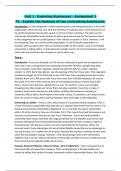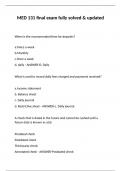Unit 1 - Exploring Businesses – Assignment 1
P1 - Explain the features of two contrasting businesses.
Introduction – In this assignment I will be exploring two contrasting businesses. A for-profit
organisation which one that runs with the intention of making money. Many businesses are
for-profit companies that provide a good or service to their customers. The gains can be
used to pay shareholders and investors as well as generate income for the business owner.
In this assignment the for-profit business I have chosen to explore is Tesco. However, I will
be comparing Tesco to a not-for-profit organisation. A not-for-profit organisation is a
business with a purpose other than to maximise profits for the owners, such as serving the
community or aiding others. It must generate enough revenue to meet its expenses, but any
extra cash is put back into the company or put to other uses.
Tesco -
Introduction - Tesco was founded in 1919 and has continued to grow and to expand ever
since and is now a recognised brand nationally around the UK where people shop daily.
Tesco's founder Jack Cohen originally started out with him behind a stall in Hackney,
London. In 1929, Burnt Oak, Barnet, saw the opening of the first Tesco store. This expanded
and became bigger by 1939 which led to over 100 Tesco stores opening across the country.
Globally, there are 6,784 stores and Tesco have more than 500,000 employees all around
the world. From the 1990s Tesco became an international business of more than 3,200
stores. Tesco's have become a global store in over 12 countries. Tesco is an everyday
shopping store that people use to buy their everyday essentials. Tesco has a range of
products from food to electronics and clothes, profiting their business massively as
customers will be able to find whatever they need in store. If customers can’t shop in store,
they can access it easily online and find whatever they need right at their fingertips.
Ownership & Liability - Tesco is a PLC which means it is a private limited company. A PLC is
a form of business organisation that operates as a separate legal entity from its owners. It is
formed and owned by shareholders. BlackRock, Inc. is currently the largest shareholder,
with 6.9% of the shares in Tesco as of October 2021. This means they fund the business and
invest in it too however they do not own Tesco. Moreover, Tesco have limited liability
ownership which means that they have legal protection for shareholders and owners that
prevents individuals from being held personally responsible for their company’s debts or
financial losses. The business owners are only responsible for the business' debts, not
personal assets. Some advantages of having limited liability ownership are tax advantage as
you pay less tax, it is a stable form of structure because the business continues to exist even
when the shareholders change. However, a few disadvantages that come with limited
liability is that it can be costly to sell shares to the public and that it may be complicated and
time consuming for legal formalities to be set up.
Purpose, Business Missions, Vision & Values, Aims & Objectives - Tesco's key goals are to
increase profits and grow their company. Their second purpose is to help people save
money by selling their product cheaper compared to other supermarket stores. Also, they
, have many other core purposes and values listed on their website such as reducing food
waste globally and ensuring surplus food goes to those in need. They also believe in making
it easier to live more healthily. They source high quality, affordable and sustainable
products. Tesco anticipate and respond to their customers need and expectations by
understanding them. Tesco's purpose within communities is to help create good jobs,
support local suppliers and producers, helping local causes through their community
programmes. Moreover, Tesco has a massive commitment to sustainability because it is
core to their business. They are trying to reduce their environmental impact and support a
healthier way of living.
Sector - Tesco is a private limited company (PLC) within the private sector. Since Tesco is
privately owned and operates on a for-profit basis, it is considered to be in the private
sector and has no connection to the government. Tesco is part of the tertiary sector which
means that they provide goods and services to the public. Their suppliers—Tesco
Corporation Manufacturing—deliver their goods to them. They sell various kinds of goods
and supply a range of services such as food, accessories, medicine, deliveries and customer
assistance.
Scope & Size - One of the biggest food retailers in the world, particularly in the UK, is Tesco.
Tesco has 5000 stores worldwide in continents of Europe and Asia. Tesco operates in over
12 different countries. As of 2022, Tesco employed 354,744 employees on average. Tesco
has a range of stores such as supermarkets, hypermarkets, and superstores. Tesco Extra
stores are bigger and primarily located in outlying hypermarkets that carry the majority of
Tesco's product lines. Some of these stores are also found in the centre of towns and cities.
Tesco Superstores are typical big supermarkets that carry less non-food items than
hypermarkets but still carry a wide selection of groceries. Tesco Express shops are smaller
convenience shops stocking mainly food with an emphasis on higher-margin products such
as sweets, crisps, chocolate, biscuits, fizzy drinks (food you would find in a corner shop to
eat on the go), and processed food alongside everyday essentials. They are located in busy
city-centre districts, small shopping precincts in residential areas, small towns, and villages
this means you may see them often especially if you work in town. They even offer financial
services through Tesco Bank and run a mobile phone business called Tesco Mobile across
the United Kingdom, Ireland, Slovakia, Hungary, and the Czech Republic.
Macmillan Cancer Support -
Introduction - The non-profit organisation is a charity called Macmillan Cancer Support
which was launched in 1911 founded by Douglas Macmillan at Castle Cary, Somerset in the
United Kingdom. Douglas created the charity organisation following the death of his father
from the disease. The charity provides specialist health care, information, and financial
support to people affected by cancer. Originally the organisation was called ‘Society for the
Prevention and Relief of Cancer.’ In 1924, the charity name changed to ‘National Society for
Cancer Relief’. Again in 1989 the name changed to ‘Cancer Relief Macmillan Fund’ then later
changed to ‘Macmillan Cancer Relief’. However, they finally changed the name to Macmillan
Cancer Support on the 5th of April 2006 because the name was more accurate as they
support people who have cancer and give advice to those with relatives who suffer from





